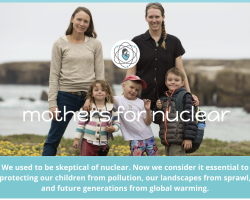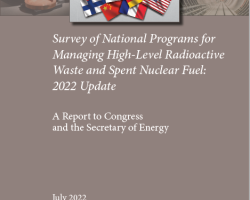Category of Content
Siting Experience Documents Only
Publication Date
Subject Matter
Keywords
Methodology for Radiological Risk Assessment of Deep Borehole Disposal Operations
Methodology for Radiological Risk Assessment of Deep Borehole Disposal Operations
Deep Borehole Safety Analysis
Deep Borehole Safety Analysis
Deep Borehole Disposal Safety Case
Deep Borehole Disposal Safety Case
Emplacement Mode Hazard Identification and Analysis
Emplacement Mode Hazard Identification and Analysis
Generic Deep Geologic Disposal Safety Case, Rev 1
Generic Deep Geologic Disposal Safety Case, Rev 1
GENERIC DEEP GEOLOGIC DISPOSAL SAFETY CASE, Annotated Outline
GENERIC DEEP GEOLOGIC DISPOSAL SAFETY CASE, Annotated Outline
A Safety Framework for Disposal of Heat-Generating Waste in Salt: Annotated Outline
A Safety Framework for Disposal of Heat-Generating Waste in Salt: Annotated Outline
Preliminary Simulation of the Corrosion Rate of Archaeological Glass
Preliminary Simulation of the Corrosion Rate of Archaeological Glass
Implementation of Small Diameter Borehole Thermal Experiments at WIPP
Implementation of Small Diameter Borehole Thermal Experiments at WIPP
Preclosure Risk Assessment for Deep Borehole Disposal
Preclosure Risk Assessment for Deep Borehole Disposal
Experimental Determination of Cerianite (CeO2) in High Ionic Strength Solutions at High Temperatures: An Analog to An(IV)
Experimental Determination of Cerianite (CeO2) in High Ionic Strength Solutions at High Temperatures: An Analog to An(IV)
UNF-ST&DARDS Documentation Release 3.0
UNF-ST&DARDS Documentation Release 3.0
Mothers for Nuclear Flyer
Mothers for Nuclear Flyer
Mothers for Nuclear Informational Flyer
Guidance for Creating a Community Benefits Plan for Regional Direct Air Capture Hubs
Guidance for Creating a Community Benefits Plan for Regional Direct Air Capture Hubs
This document is intended to provide supplemental information to assist applicants developing a Community Benefits Plan (CBP) for the Regional Direct Air Capture Hubs. As shown in the graphic to the right, Community Benefits Plans are based on a set of four core interdependent policy priorities: engaging communities and labor; investing in America's workforce; advancing diversity, equity, inclusion, and accessibility; and implementing Justice40.
The Social and Ethical Aspects of Nuclear Waste
The Social and Ethical Aspects of Nuclear Waste
Nuclear waste management seems to exist in a perpetual state of crises. For 50 years the nuclear states of the world have fought, and generally lost, the battle to deal with the nuclear waste problem. Worldwide, there is a growing acknowledgement within industry and government that social and ethical issues are just as important as technical issues when developing safe programs for nuclear waste management. This paper is a review of some of the outstanding social and ethical issues that are influencing discussions on nuclear waste management around the world.
Policies for Achieving Energy Justice in Society: Best Practices for Applying Solar Energy Technologies to Low-Income Housing
Policies for Achieving Energy Justice in Society: Best Practices for Applying Solar Energy Technologies to Low-Income Housing
Studies indicate that the energy burden — energy costs as a percentage of annual family income — on low-income families is inordinately high, compared to that of the rest of the population. Rising fuel costs exacerbate this problem. Residential solar energy systems can help address this situation by furnishing a price-stable energy source with the added benefit of reduced greenhouse gas emissions. However, without appropriate incentives, these systems are prohibitively expensive for low-income families.
Dose Rate Calculations for the 2-MCO/2-DHLW Waste Package
Dose Rate Calculations for the 2-MCO/2-DHLW Waste Package
Survey of National Programs for Managing High-Level Radioactive Waste and Spent Nuclear Fuel: 2022 Update
Survey of National Programs for Managing High-Level Radioactive Waste and Spent Nuclear Fuel: 2022 Update
In October 2009, the U.S. Nuclear Waste Technical Review Board (Board or NWTRB) published Survey of National Programs for Managing High-Level Radioactive Waste and Spent Nuclear Fuel. For each of the 13 national programs studied, the report catalogued 15 institutional arrangements that had been set in place and 15 technical approaches that had been taken to design repository systems for the long-term management of high-activity radioactive waste.


